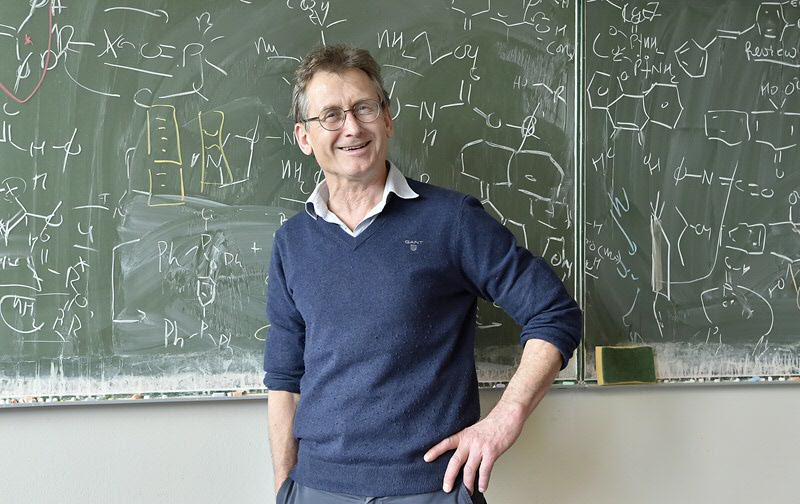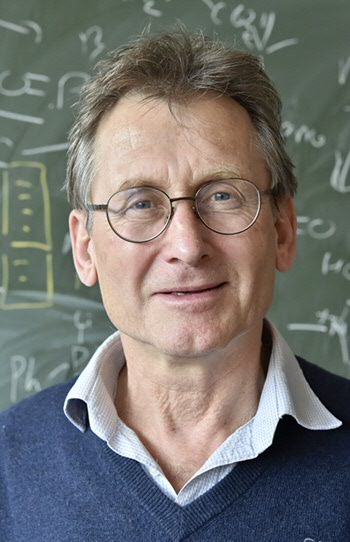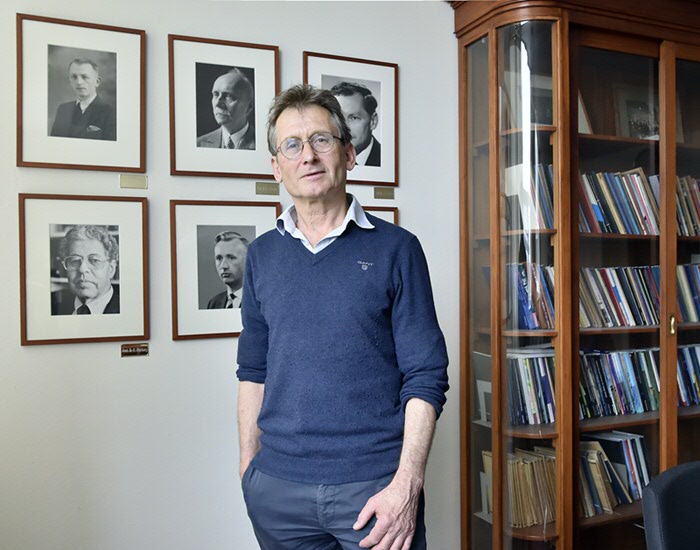‘Encouraging young people, that’s my most important job’
Four and a half years ago, he received the Nobel Prize. During the award ceremony in Stockholm, Ben Feringa made a resolution: I will put science on the map. His mission is being given a new boost with the establishment of the Ben Feringa Fund, which aims to increase public interest in science, starting with a science quiz and a tour of secondary schools.
Text: Riepko Buikema, UG Communication Office, photos: Elmer Spaargaren

Despite being in the middle of an interview, Ben Feringa continues to teach. Before the conversation starts, he hands over a book by science journalist Esther Thole. Makers van leven. Hoe wetenschappers leven bouwen in het lab. [Life makers. How scientists build life in the lab.] ‘Here, this is for you.’ He can’t sit still. He tilts back on his chair, then leans forward again intently. Drops a pen on the table to reinforce his argument about Einstein’s theory of relativity.
Chalk sticks
‘Science is a passion. A way of life’, he says superfluously. He points to the old-fashioned blackboard in his room. It’s full of molecule sketches. In the tray below lie dozens of chalk stubs. ‘Look, the board is completely full. Science thrives on live discussion and on attempting to teach each other a lesson. Especially after winning the Nobel Prize, I toured around a lot. I really enjoy the fact that I have more time for my folks in Groningen because of the coronavirus pandemic. Spending entire days talking and discussing with students and PhD students gives me a lot of energy.’
Inequality
Reaching people. Getting students to think. Challenging students to explore their limits. Feringa considers this his most important job. ‘When I was awarded the Nobel Prize, I was asked: now that you have been awarded the highest distinction in science, what will you do next? There in Stockholm I decided: putting science on the map, that’s my main priority. To make our society aware of the importance of knowledge. Knowledge causes progress on all fronts. Not only in technology, but also when it comes to our legal system, or to inequality in our society.’
Paradiso
This conviction put him on numerous stages: from community centres to music venue Paradiso, and from secondary schools to large international conferences. For years, Feringa has participated in public events. ‘I don’t need to earn any money doing that, but sometimes they do want to give you something. A donation of some kind. The Ben Feringa Fund has now been set up for gifts like that, to use that money to put science on the map.’
The first activity to increase society’s appreciation of science is the Groningen Science Quiz on 31 May, and anyone can participate from home free of charge. Next stop: secondary schools comprising pupils who don’t yet have a strong connection to university.
Out of bounds
He points to his own life path. He grew up in Barger-Compascuum, in the southeast corner of Drenthe. ‘An area of farmers and labourers. My parents’ education doesn’t go further than primary school, but I did get that chance. I count myself lucky that I could go to secondary school and had the good fortune of meeting very good teachers there. They made the difference. They encouraged me and even stepped out of bounds a little by teaching me more than the official material. I want everyone to experience that.’

Asking questions
The main purpose of the school visits that will soon spring from the Ben Feringa Fund: a warm introduction to academia, to plant the seeds for a critical, open attitude and for the courage to ask questions. ‘I offer pupils a different perspective on science than the usual teaching material. What exactly is science? What is studying? What wide-ranging directions do you have at a university? What does it mean to build knowledge, to expand the boundaries of knowledge?’
Journey of discovery
Don’t get me wrong, Feringa continues. ‘I don't mean that everyone should go to a university of applied sciences or a research university. I have incredible admiration for a good carpenter, nurse or electrician. My starting point is the pleasure of scientific discovery. It doesn’t always have to be easy and fun. It is good to just take a look: what can I really do? Once pupils realize this and I can contribute to that realization through my fund, then we will achieve something. If COVID-19 allows it, we will start this autumn.’
Sparking curiosity
Feringa hopes to spark the curiosity of pupils. Just as he himself was encouraged in his youth, as the second-oldest in a family of 10 children, to think and participate. ‘Despite their limited education, my parents were well-read. Later, I discovered that even my grandparents had a subscription to the Nieuwe Rotterdamsche Courant. Discussions were commonplace in our home – about books, science, religion and politics. Sometimes, these discussions were very intense. We stimulated each other a lot. It was wonderful.’
Never study again
With a twinkle in his eyes, he recounts how history repeated itself during one of his guest lectures, when a girl of 15 raised her finger soon after his kick-off and calmly kept it up for 10 minutes. ‘Professor Feringa, Professor Feringa? Now that you have the Nobel Prize, you must be happy that you never have to study again.’ ‘The whole room laughed, of course. I explained that I had just started a first-year book on cell biology. That, for my research, I have to learn new things all the time. During the break, the girl came up to me: “That was a joke, right, about the book?” That’s what I like about it. I enjoy that interaction, especially when I noticed that I had made her think. That is a rewarding job.’

Encouragement
He sees it as a university’s most important mission: putting young people on the path to their future. ‘That applies even more to primary and secondary education. The shortage of teachers is the real problem in the Netherlands. Make sure you have your education in order. That’s where everything starts. I will not neglect spreading that message.’ It is with great admiration that he witnessed the career switch of his youngest daughter Emma, who is a lateral entrant in the classroom at an primary school in Amsterdam-West. ‘There are 30 pupils, 28 of whom have a migration background. It’s nice to see that she is enthusiastic about transferring knowledge to children. But teachers don’t all have it easy. That is another reason why I am visiting schools: to encourage them.’
Feringa would love to keep doing so for years to come, even though he recently celebrated his seventieth birthday (‘Yes, yes. Don’t put that in too emphatically.’) ‘I am grateful to the University of Groningen that I am allowed to continue. I have a certain spirit and enthusiasm for encouraging young people. I have a lot of fun doing that. I could keep that up for a long time.’
About the Groninger Science Quiz on 31 May
On Monday 31 May, Studium Generale, the Ben Feringa Fund and Forum Groningen are organizing the Groningen Science Quiz, in which anyone can participate from home free of charge. Jury member Ben Feringa: ‘The questions cover the entire spectrum of academia, from astronomy to philosophy. It is a privilege to be able to participate. I will occasionally give explanations and background information to enthuse the audience and the participants. It’ll be great fun!’
For more information and to sign up, visit the Studium Generale website.
More news
-
29 January 2026
Microplastic research - media hype or real danger?
-
27 January 2026
ERC Proof of Concept grant for Maria Loi
